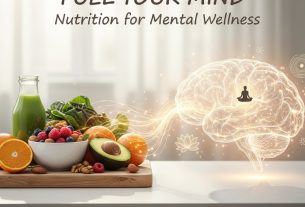Estimated Reading Time: 13 minutes
EEer feel like your brain’s a sputtering engine, struggling to keep up with the demands of the day? Maybe you chalk it up to stress or lack of sleep.
But what if the fuel you’re putting into your body—your diet—is a major factor in how well that engine runs?
This isn’t just about avoiding the’freshman fifteen’; it’s about understanding how how nutrition affects mental health.
The connection might be more profound than you realize.
We’re not just talking about feeling good physically. The food we eat directly impacts our mood, cognitive function, and overall mental well-being.
This blog will explore the intricate relationship between nutrition and mental health, offering practical tips and insights to empower you to take control of your mental fitness.
The human brain is a remarkable organ, constantly working, consuming a significant amount of energy.
This energy comes, of course, from the food we eat.
When we nourish our bodies with the right nutrients, we’re essentially giving our brains the building blocks they need to function optimally.
Conversely, a diet lacking in essential nutrients can starve the brain, leading to a cascade of negative effects, from mood swings and anxiety to more serious mental health conditions.
Consider it this way: you wouldn’t expect a high-performance car to run on low-grade fuel. The same principle applies to our brains.
The link between diet and mental health isn’t some new-age fad; it’s backed by a growing body of scientific evidence.
Researchers are increasingly uncovering the mechanisms through which food influences our mental states.
For example, certain nutrients play a vital role in the production of neurotransmitters, the chemical messengers that transmit signals between brain cells.
Deficiencies in these nutrients can disrupt neurotransmitter balance, leading to mood disorders, cognitive impairments, and other psychological problems.
This is where the discussion of how nutrition affects mental health begins to come alive.
We must examine the specific nutrients, the specific foods, and the specific habits that can either harm or heal our minds. Let’s delve deeper.
What should we be eating? The answer isn’t as simple as a one-size-fits-all approach.
However, some nutrients stand out as particularly crucial for maintaining optimal mental health.
A balanced diet rich in these essential elements can significantly improve mood, cognitive function, and overall mental well-being.
Let’s explore some of the most important players in the nutrient game.
Omega-3 fatty acids, particularly EPA and DHA, are vital for brain health.
These essential fats are structural components of brain cell membranes and play a crucial role in communication between brain cells.
Research suggests that omega-3s can help reduce symptoms of depression, anxiety, and even ADHD.
Sources include fatty fish (salmon, mackerel, sardines), flaxseeds, chia seeds, and walnuts.
Think of them as the’lubricant’that keeps the brain’s gears turning smoothly.
B vitamins are essential for converting food into energy, supporting brain function, and producing neurotransmitters.
Deficiencies in B vitamins, especially B6, B9 (folate), and B12, have been linked to depression, cognitive decline, and other mental health issues.
Find them in whole grains, leafy greens, legumes, meat, and dairy products.
A breakfast bowl of oatmeal with berries, nuts, and seeds is a wonderful start to a day with these nutrients.
Vitamin D plays a critical role in brain development and function. It’s been linked to mood regulation and may help protect against depression.
While your body can produce Vitamin D through exposure to sunlight, many people are deficient.
![Healthy in Fuel Your Mind: How Nutrition Affects Mental Health [Guide] healthy for fuel your mind: how nutrition affects mental health [guide]](https://www.inspirelmystyle.com/wp-content/uploads/2025/09/temp_healthy_1757003676.webp)
Consider spending more time outside (safely!), supplementing with Vitamin D, or eating foods fortified with the vitamin like milk, orange juice, and some cereals.
Magnesium is involved in over 300 biochemical reactions in the body, including those related to mood and stress regulation.
A deficiency can contribute to anxiety, depression, and insomnia.
Foods rich in magnesium include leafy greens, nuts, seeds, and dark chocolate (yes, really!).
Antioxidants help protect brain cells from damage caused by free radicals.
Consuming foods rich in antioxidants (fruits, vegetables, and colorful produce) can help improve cognitive function and reduce the risk of age-related cognitive decline.
Consider adding berries, spinach, and colorful peppers to your daily intake.
Beyond individual nutrients, the overall dietary pattern is crucial. Several eating styles have been shown to positively impact mental well-being.
Consider these options:
Think about a mental wellbeing friendly dietary pattern as the “blueprint” for how you eat.
It’s less about a single food and more about the combination of food to support your brain function.
Did you know your gut and your brain are in constant communication?
The gut-brain axis is a bidirectional communication pathway that links the gut microbiome (the community of microorganisms in your gut) with the brain.
The gut microbiome plays a crucial role in modulating mood, cognitive function, and behavior.
The gut produces 90% of the body’s serotonin, a neurotransmitter associated with mood regulation.
In the context of how nutrition affects mental health, gut health is paramount.
When your gut microbiome is healthy, it can positively influence your mental state. This includes improved mood and reduced anxiety.
Conversely, an imbalance in your gut bacteria can contribute to inflammation, which has been linked to depression and other mental health disorders.
This is why a diet rich in fiber, prebiotics (foods that feed beneficial bacteria), and probiotics (live beneficial bacteria) is essential.
Yogurt, kefir, sauerkraut, and kimchi are great sources of probiotics.
The concept of gut health often gets overlooked, but it’s crucial to note its significant role in the how nutrition affects mental health discussion.
Think about cultivating a healthy garden in your gut, and choosing foods that act as “fertilizer” and “seeds” to support the healthy bacteria.
Knowing the theory is one thing, but putting it into practice is what truly makes a difference.
Here are some actionable tips to incorporate brain-boosting nutrition into your daily life:
Implementing these strategies requires commitment and a personalized approach. Start small, make gradual changes, and be patient with yourself.
There’s no overnight fix, but the benefits of a brain-healthy diet are worth the effort.
Remember, even small steps can lead to significant positive changes in your mental well-being.
Many people have a hard time believing there’s a strong link between diet and mental health.
One common misconception is that food only affects physical health.
It’s easy to focus on calorie counts and macro breakdowns, overlooking the important role food plays in mood, energy levels, and focus.
Another misconception is that supplements can replace a healthy diet.
While supplements can be helpful, they’re not a substitute for eating a balanced diet.
Nutrients work synergistically, and your body absorbs nutrients better when they come from whole foods.
![Affects in Fuel Your Mind: How Nutrition Affects Mental Health [Guide] affects for fuel your mind: how nutrition affects mental health [guide]](https://www.inspirelmystyle.com/wp-content/uploads/2025/09/temp_affects_1757003674.webp)
Furthermore, supplements may lack the fiber and other beneficial compounds found in food.
Finally, some believe that mental health issues can only be solved with medication.
In reality, there are many tools we can use in the toolkit, and nutrition is an important tool to learn about!
Obstacles to consider include limited time for meal preparation, the cost of healthy foods, and the influence of advertising and cultural norms.
These issues, however, can be overcome with planning, mindful grocery shopping, and a commitment to making gradual changes.
Consider meal-prepping on the weekends to save time or focusing on more affordable options.
Additionally, it’s important to be aware of marketing tactics and advertisements to make informed choices.
It’s worth noting that there’s still ongoing research to show the benefits.
In 2024, a meta-analysis published in the Journal of Affective Disorders demonstrated a significant positive correlation between dietary interventions and improved mental health outcomes, reinforcing the importance of nutrition in treating and preventing mental health disorders.
This highlights the need for broader education on the issue.
The journey to mental well-being is multifaceted.
While it can involve therapy, exercise, and other strategies, one of the most fundamental pillars is, undoubtedly, nutrition.
Understanding how nutrition affects mental health empowers you to become an active participant in your own well-being.
By nourishing your brain with the right nutrients, you’re not just feeding your body; you’re fortifying your mind.
So, where do you start? Begin by making small, manageable changes. Add a serving of fruits or vegetables to your meals.
Swap out sugary drinks for water. Gradually introduce more whole foods into your diet. And most importantly, be patient with yourself.
The benefits of a brain-healthy diet are substantial and far-reaching, impacting not only your mood and cognitive function but also your overall quality of life.
Ready to take the next step in your health journey? Join our newsletter for weekly health tips!
The timeline for seeing improvements varies from person to person, but many people report noticing changes within a few weeks of adopting a more brain-healthy diet.
However, it’s important to be patient.
Some people experience more immediate boosts in energy and mood, while others might see gradual improvements in cognitive function and emotional stability over several months.
Factors like individual metabolism, existing health conditions, and the extent of dietary changes all play a role.
Consistently eating a balanced diet rich in essential nutrients will pay off, even if the results aren’t immediate.
While a healthy diet can significantly improve symptoms of depression and anxiety, it’s not always a cure-all.
Nutrition is a powerful tool, but mental health is complex.
Many people benefit from a multi-faceted approach that includes therapy, medication (if prescribed by a doctor), lifestyle changes, and a supportive social network.
A well-balanced diet can act as a strong foundation for overall mental health, potentially reducing the need for medication or enhancing its effectiveness, but the specific needs are unique to each person.
While there’s no instant magic bullet, certain foods can provide an immediate lift in mood and energy.
Complex carbohydrates, like oatmeal or whole-wheat toast, release glucose slowly, providing a steady stream of energy.
Dark chocolate (in moderation!) releases endorphins, which can improve mood.
Foods rich in tryptophan, like turkey and eggs, can help produce serotonin, a mood-boosting neurotransmitter.
Ultimately, the most significant improvements come from consistent adherence to a balanced diet rather than relying on specific quick fixes, though these can be a nice treat.
Processed foods and added sugar are generally not your friend when it comes to mental well-being.
![Nutrition affects in Fuel Your Mind: How Nutrition Affects Mental Health [Guide] nutrition affects for fuel your mind: how nutrition affects mental health [guide]](https://www.inspirelmystyle.com/wp-content/uploads/2025/09/temp_nutrition_affects_1757003674.webp)
They can contribute to inflammation in the brain, disrupting neurotransmitter function and increasing the risk of mood disorders.
Processed foods are often low in essential nutrients and high in unhealthy fats and refined carbohydrates, which can lead to energy crashes and mood swings.
Excessive sugar intake can also contribute to insulin resistance, which has been linked to depression and other mental health issues.
Cutting back on these foods and replacing them with whole, unprocessed options is a key step in supporting brain health and managing mental health symptoms.
Eating healthy on a budget is possible with some planning and smart shopping strategies.
Start by planning your meals for the week and making a grocery list to avoid impulse purchases.
Shop for seasonal fruits and vegetables, which are generally cheaper.
Focus on whole, unprocessed foods that offer the most nutritional value for your money.
Frozen fruits and vegetables are a great alternative to fresh and can last longer.
Cook at home more often, as eating out can be expensive and less healthy. Bulk buying staples like grains, beans, and lentils can also save money.
Ultimately, prioritizing whole foods and planning your meals ahead of time can help you eat well without breaking the bank.
Complete elimination is often unnecessary. It’s more effective to focus on a balanced and varied diet.
For some individuals, however, eliminating certain foods may be beneficial.
For example, those with known food sensitivities or allergies, such as gluten or dairy, may see improvements by removing those foods from their diet.
If you suspect you have a food sensitivity, consult with a healthcare professional.
In general, it’s more beneficial to crowd out less healthy foods with nutrient-rich ones than to restrict your diet.
A holistic approach that focuses on what you can add to your diet rather than what you need to remove is the most sustainable and health-promoting in the long term.
Frequently Asked Questions
How quickly can I expect to see improvements in my mental health after changing my diet?
The timeline for seeing improvements varies from person to person, but many people report noticing changes within a few weeks of adopting a more brain-healthy diet. However, it’s important to be patient.
Some people experience more immediate boosts in energy and mood, while others might see gradual improvements in cognitive function and emotional stability over several months. Factors like individual metabolism, existing health conditions, and the extent of dietary changes all play a role.
Consistently eating a balanced diet rich in essential nutrients will pay off, even if the results aren’t immediate.
Can I completely cure my depression or anxiety with diet alone?
While a healthy diet can significantly improve symptoms of depression and anxiety, it’s not always a cure-all. Nutrition is a powerful tool, but mental health is complex.
Many people benefit from a multi-faceted approach that includes therapy, medication (if prescribed by a doctor), lifestyle changes, and a supportive social network.
A well-balanced diet can act as a strong foundation for overall mental health, potentially reducing the need for medication or enhancing its effectiveness, but the specific needs are unique to each person.
Are there specific foods that can immediately boost my mood?
While there’s no instant magic bullet, certain foods can provide an immediate lift in mood and energy. Complex carbohydrates, like oatmeal or whole-wheat toast, release glucose slowly, providing a steady stream of energy. Dark chocolate (in moderation!) releases endorphins, which can improve mood.
Foods rich in tryptophan, like turkey and eggs, can help produce serotonin, a mood-boosting neurotransmitter. Ultimately, the most significant improvements come from consistent adherence to a balanced diet rather than relying on specific quick fixes, though these can be a nice treat.
What about the role of processed foods and added sugar in mental health?
Processed foods and added sugar are generally not your friend when it comes to mental well-being. They can contribute to inflammation in the brain, disrupting neurotransmitter function and increasing the risk of mood disorders.
Processed foods are often low in essential nutrients and high in unhealthy fats and refined carbohydrates, which can lead to energy crashes and mood swings. Excessive sugar intake can also contribute to insulin resistance, which has been linked to depression and other mental health issues.
Cutting back on these foods and replacing them with whole, unprocessed options is a key step in supporting brain health and managing mental health symptoms.
How can I make healthy eating affordable when on a budget?
Eating healthy on a budget is possible with some planning and smart shopping strategies. Start by planning your meals for the week and making a grocery list to avoid impulse purchases. Shop for seasonal fruits and vegetables, which are generally cheaper.
Focus on whole, unprocessed foods that offer the most nutritional value for your money. Frozen fruits and vegetables are a great alternative to fresh and can last longer. Cook at home more often, as eating out can be expensive and less healthy. Bulk buying staples like grains, beans, and lentils can also save money.
Ultimately, prioritizing whole foods and planning your meals ahead of time can help you eat well without breaking the bank.
Do I need to completely eliminate certain foods to improve my mental health?
Complete elimination is often unnecessary. It’s more effective to focus on a balanced and varied diet. For some individuals, however, eliminating certain foods may be beneficial.
For example, those with known food sensitivities or allergies, such as gluten or dairy, may see improvements by removing those foods from their diet. If you suspect you have a food sensitivity, consult with a healthcare professional.
In general, it’s more beneficial to crowd out less healthy foods with nutrient-rich ones than to restrict your diet. A holistic approach that focuses on what you can add to your diet rather than what you need to remove is the most sustainable and health-promoting in the long term.



